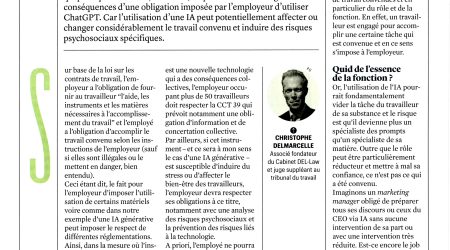Social Elections of 2020: It’s (Already) Time to Think About Them
Posted the 16 November 2018
You may be wondering why we are already discussing the social elections of 2020. While there is no shortage of “current” topics in social news, such as mobility bonuses, cash for cars, GDPR, new provisions on trade secrets, and more…
In order to determine whether a company should establish a works council (WC) or a Committee for Prevention and Protection at Work (CPPT), it is necessary to assess whether the thresholds of 50 or 100 employees are exceeded at the level of a given "technical operational unit" (TOU).
The fact is that, in order to determine whether a company should establish a works council (WC) or a Committee for Prevention and Protection at Work (CPBW), it is necessary to evaluate whether the thresholds of 50 or 100 employees are exceeded at the level of a specific "technical exploitation unit" (TEU).
In short, the TEU is an entity that has a certain level of economic and social autonomy. Sometimes it coincides with the legal entity, but in some cases, a legal entity may have multiple TEUs, and even two different legal entities can form a TEU.
Now, assuming that the upcoming social elections will indeed take place in May 2020 as usual, this means that the procedure will actually start in December 2019.
This means action must be taken now, and that 2019 will be strategically important in two ways.
On the one hand, the average Dimona declaration from the last quarter of 2018 and the first three quarters of 2019 will be crucial in determining whether the thresholds of 50 or 100 employees for the establishment of the CPBW and WC are met, respectively. Note that, compared to the previous social elections, the reference period will be brought forward by a quarter, as previously only the four quarters of the year before the elections were considered. For companies close to these thresholds who wish to avoid the establishment of a CPBW or WC, close monitoring of employee inflow and outflow during this period is required, and even external consultants may need to be involved. Furthermore, the second quarter of 2019 will be decisive for the use of temporary workers, as it is likely that the average number of temporary workers, excluding replacement contracts, will need to be calculated and added to the average of all employees. This is also a new development.
On the other hand, determining which TEUs need to be considered for the threshold assessment in 2019 will also be crucial. In fact, a strategy to avoid establishing a CPBW or WC is also to play with the concept of TEU, ensuring that there are multiple TEUs, each failing to meet the threshold, and so on. However, establishing or maintaining separate TEUs means, especially for corporate groups, ensuring that the social criteria, which take precedence over the economic criteria, are properly adhered to. Therefore, it is necessary to keep employee populations as distinct as possible, for example, with separate leadership/management, different contracts, regulations, and insurance, in geographically separate premises, with a different corporate culture, etc.
For example, if a company has acquired another company or part of it, it might be advisable to delay the integration process until after the social elections, or at least slow it down.
In short, it is high time to examine the issue of the social elections and consider the company’s strategy in this regard. Especially since decisions made now will bind the company until 2024.
In fact, regarding the social elections for the WC and the CPBW, unlike the union delegation (depending on the sector), the assessment of the TEU and the thresholds is historical and not dynamic. This means that this determination will take place once in December 2019, and whatever happens with the TEU or the number of employees in the next four years will have no impact. So, if a company does not reach the 50 employees in the reference period, it does not have to establish a CPBW until 2024, even if it exceeds the threshold after the elections.
A warned person...
Related articles

Is an employer allowed to mandate the use of artificial intelligence tools by employees ? (Trends, 17-07-2025)

Caution if a former colleague opposed to your employer asks you to testify in their favor
